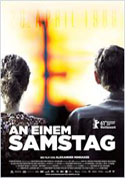

Opening 21 Apr 2011
Directed by:
Aleksandr Mindadze
Writing credits:
Aleksandr Mindadze
Principal actors:
Anton Shagin, Svetlana Smirnova, Stanislav Ryadinskiy
Twenty five years ago the Soviet Union faced a nuclear dilemma, Chernobyl, about which there have been a number of documentaries. One of the biggest problems was, and still is, lack of information. We know that hundred of thousands of people suffered and even died from radiation. Director and script writer Alexander Mindadze wanted to show the fate of human life as a result of this disaster. He portrays true stories of people who lived in the neighboring town of Pripyat. He wanted to expose the Big Lie by bring an authentic view from ghosts who lost their lives.
The film V Subbottu (Innocent Saturday) begins early on Saturday, April 26, 1986. A reactor tower at the Chernobyl power station exploded as a result of a flawed reactor design. Immediately, a façade of lies implies that everything is under control. No information was given out. It took more than 24 hours to evacuate Pripyat, a city of 50,000 people. A young man, Valery Kabysh (Anton Shagin), witnesses and understands the problem, but is unable to flee since his day-to-day life holds him back. It is a Saturday and people shop, children play, and life is carefree. Valery tries to escape with his girlfriend Vera (Svetlana Smirnaova-Marcinkevich) who can’t find her passport and breaks her shoe while running to catch the last train. In the end, she buys another shoe, they play in a band until late at night, and, despite his panic, he just carries on with his life. The images are surreal and, knowing that each second counts, it is hard to watch these innocent people being exposed to an invisible enemy, radiation, which will reduce their chances of survival.
Recently, I saw a documentary on “extreme tourism,” where tourists with their Geiger counters headed off to Pripyat, a sinister location still uninhabited. They were fascinated and enjoyed this macabre location, but lacked the compassion and understanding of the fate of those people who lived and died since that disaster occurred. It seems natural that the victims, in a state of shock, would continue their daily routines. But, in a wider sense, are we all not also still in a state of shock, moving forward through our everyday lives, not acknowledging that something terrible has happened and we need to change our paths? (Shelly Schoeneshoefer)